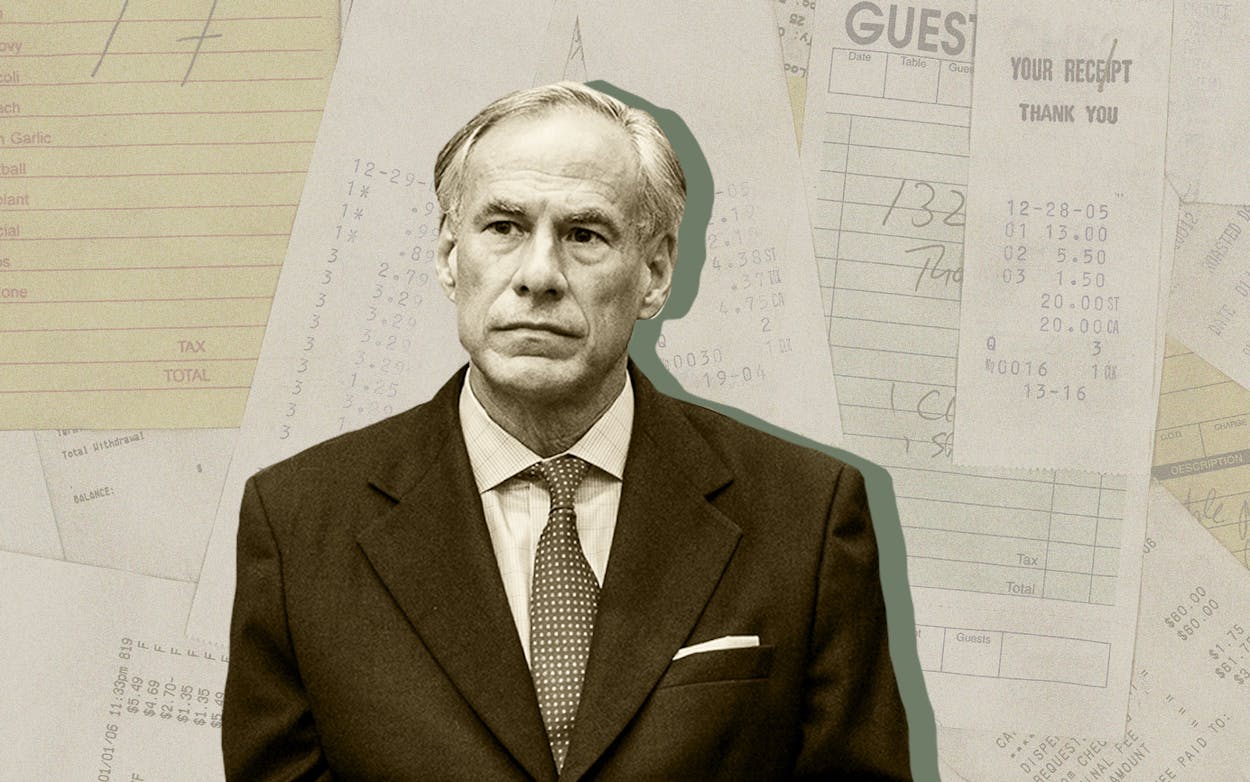One of the most pervasive myths about Texas is that it’s a low-tax, low-spending state. It’s true that Texas doesn’t have a state income tax. But Texas’s per-capita government spending isn’t that much lower than the national average, and its tax system is highly regressive. The citizens of even the reddest of red states still want roads, schools, and a basic level of social services. Those things cost a lot of money, and that money has to come from somewhere.
In Texas, we raise money for government primarily through steep property taxes and an unusually high state sales tax. (If the Big Three—Governor Greg Abbott, Lieutenant Governor Dan Patrick, and House Speaker Dennis Bonnen—get their way this session, Texas will soon match California for the highest sales tax in the country.) Then there’s the franchise tax—a widely despised and ineffective business tax instituted in its current form in 2007. State spending is otherwise supplemented by arbitrary or punitive fees, like the ones hidden in the Driver Responsibility Program. This rickety financial apparatus is backstopped by high levels of local debt.
Every few sessions, lawmakers try to rejigger the system to make it look like they’ve lowered the tax burden somehow, but they rarely seem to make a mark. Past efforts to cut into property taxes, like the ones in 2007 and 2015, went unnoticed by most people, even though they cost the state many billions of dollars. Nonetheless, the tax-cutting rhetoric remains extremely hawkish.
Take Governor Abbott, for example. On Sunday, at the urging of one of his followers, he tweeted, “Property tax itself is unfair. Any amount. What it boils down to is, the government owns it , not you. Period!!!!!”
Property tax itself is unfair. Any amount. What it boils down to is, the government owns it , not you. Period!!!!!
There, William, I tweeted it. Because it's true. That's why I'm trying to shift from a property tax system to a consumption tax system so you control what you pay. https://t.co/kuXoNhPovC— Greg Abbott (@GregAbbott_TX) April 15, 2019
Here is how public policy works in 2019: A man on Twitter with six followers who claims to be from Kentucky and whose feed consists of a lot of racist conspiracy-mongering dared the governor of Texas to declare that his state’s tax regime is immoral, and the governor did. “There, William, I tweeted it,” Abbott continued. “Because it’s true. That’s why I’m trying to shift from a property tax system to a consumption tax system so you control what you pay.”
Many people across the political spectrum agree that Texas is too dependent on property taxes and that homeowners’ bills are rising too rapidly. But that’s not what Abbott is saying here. He’s making an argument that property taxes are so immoral that they should be abolished and replaced with consumption taxes like the highly regressive sales tax. There are a couple of strange things about this. First, as much as Abbott and other top state officials talk tough on property taxes, they’ve never done much to cut them significantly. Even this year, the biggest point of contention at the Lege involves how to trigger rollback elections, not the tax regime per se.
Second, let’s credit Abbott with the conviction, expressed by William, that property taxes amount to homeowners or business owners “renting” their property from the government. (The logic behind property taxes, of course, is that property owners ought to pay for services that not only make life livable but also increase the value of that property.) In what manner are sales taxes, whereby the government charges a steep fee on individuals for the purchase of basic necessities, more reasonable or ethical? If the property tax is the government renting your home to you, the sales tax is the government leasing your shirts to you. Yet it’s a staple of conservative thought in Texas that the latter is much “freer” than the former.
The trick, of course, is that consumption taxes are regressive, and property taxes are not. Again, because there’s no state income tax, the burden of funding state government falls disproportionately on poor and middle-class folks. The poorest half of Texans pay more than 10 percent of their annual income on state and local taxes, according to the Institute on Taxation and Economic Policy, making the state’s tax structure one of the most regressive in the country. Swapping property taxes for sales taxes would heap even more of that burden on those who can least afford it. Rich Texans have many lobbyists; poor Texans do not.
Tax-hawk talk is a regular staple of legislative sessions, and it’s easy to see why. Republicans, who have been in power for decades, have no reason to claim to be surprised by the status quo, and in many ways the status quo is unjust. But their rhetoric clouds more than it clarifies. There’s a real problem here: The way state government is funded is imbalanced and inefficient. Someday, we might have an honest discussion about that. For now, people seem content to talk big and nibble around the margins.
- More About:
- Politics & Policy
- Greg Abbott








